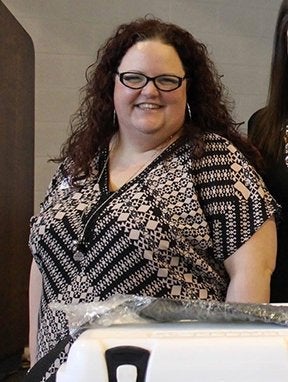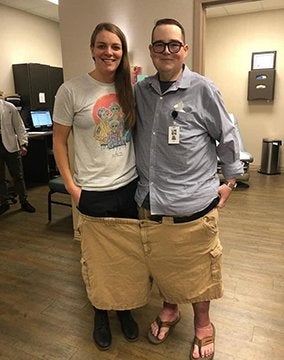Obesity has tripled in the United States since the 1970s, according to the Centers for Disease Control.
More than 42 percent of adults are classified as obese, according to the 2017-2018 data from the CDC. That’s up from 30.5 percent in the year 2000.
[adrotate banner=”13″]
Obesity is defined as having a body mass index of more than 30. About 9.3 percent of Americans are considered severely obese, which means they have a body mass of 40 or are 100 pounds or more over their ideal weight.
Losing weight and keeping it off isn’t easy, but three area residents have proven they can lose more than 100 pounds and keep it off. Here are their stories.
Melissa Wilson
Melissa Wilson struggled with her weight most of her life.
“Even in elementary school,” said Wilson, the 41-year-old Graniteville, S.C. mom of two who works as the assistant human resources director at the University of South Carolina Aiken.
Her experiences with dieting started when she was in the sixth grade. Along with her parents, she went on a diet called Prism, and the entire family had success with both her parents and Melissa losing weight. She lost 25 pounds.
Melissa Wilson lost 135 pounds after gastric bypass surgery in 2016. She weighed 285 pounds at her heaviest. In her after picture, she’s pictured with her husband Paul. Special photos provided to The Augusta Press.
“I was normal-sized for the first time,” she said.
That changed a few years later when her mother was diagnosed with cancer and later died.
“My dad didn’t know how to cook,” she said. “We ate out a lot.”
And those trips to restaurants led to some unhealthy eating habits for Wilson and subsequent weight gain.
“When I thought of portion sizes, I thought of sizes based on what restaurants served,” she said.
[adrotate banner=”38″]
In addition, Wilson was an emotional eater, drawing on food as a source of comfort.
That emotional spiral took its toll again when her father passed away in 2015.
“The year after he died was horrific. I was the heaviest I’d ever been,” she said. “I was almost 300 pounds, and I was not okay with that.”
She was concerned about how that excess weight would affect her health. At the time, Wilson only had one child, and she didn’t want Maggie to be without a mother. She had her second child, a son named Owen in October 2018.
“I wanted to make myself healthy so I could be here longer,” she said.
She knew she had to do something. She’d watched as one of her co-workers went through gastric bypass. The co-worker weight about 325 pounds and whittled down to under 200.
“I thought, ‘If she can do it, I can do it,’” she said.
She marched into her co-worker’s office one day determined to get all the details. She was committed to the idea.
In May 2016, she began to prepare for the November surgery. During that time, she carefully controlled her portions and caloric intake and dropped more than 40 pounds.
She lost 135 pounds, and her husband, Paul, dropped 40 pounds along with her. At her lowest, she was 150 pounds.
Once the surgery took place, Wilson has had to continue to follow a stringent regimen.
A self-described workaholic, Wilson said she had been known to skip some meals because she was working, but those days are over. She has to eat small meals throughout the day.
She also continues to watch those portion sizes. She also has to focus on eating enough protein.
While there may be a time or two when she overdoes it, it’s not common for her. She knows that she will have to continue to do the things she’s learned to hold onto her success.
“You can stretch the stomach back out, and there is no second time around,” she said.
[adrotate banner=”13″]
Sarabeth Wheeler
An active child and teenager, Sarabeth Wheeler was concerned when she started gaining weight while in college.
“I was on an ROTC scholarship and doing PT three days a week,” said Wheeler. “I was working out, but my weight was going up.”
Sarabeth Wheeler lost more than 100 pounds and has kept it off. Her current exercise of choice is Cross Fit. Before picture: Special photo provided to The Augusta Press. After picture: Staff photo by Charmain Z. Brackett.
As the weight continued to come on, Wheeler couldn’t pass her PT test. She was living in Colorado at the time and went to her doctor who “blew it off,” she said. But she knew something had to be wrong.
“I switched doctors and the new doctor said, ‘I think you might have PCOS (polycystic ovary syndrome),’” said Wheeler.
PCOS is a hormonal disorder and one of the possible symptoms is obesity, according to the Mayo Clinic’s website.
When she heard weight gain was a symptom, she thought her days of being trim and toned were over. At her highest, Wheeler weighed 265 pounds.
“I figured I was destined to be heavy. I wasn’t working out. I was eating whatever I wanted to,” she said.
At the time, she was working as a gymnastics coach. One day, one of the parents asked to move their child to another coach.
“I had a come to Jesus moment,” she said when she learned the reason for the move. The parent wanted another coach because she believed Wheeler was too heavy.
Wheeler said she was immediately offended, but later she decided the parent was right.
“I was not where I wanted to be,” she said.
[adrotate banner=”34″]
Wheeler decided PCOS or not she was going to take control of her life as best she could. In 2011, at the age of 21, she started out by going to Weight Watchers and taking up kickboxing.
“At that point I hadn’t had any children. I made up my mind that I didn’t want to be the mom who was too winded to play. I wanted to be the mom who was running around and playing,” she said.
Over the next two years, Wheeler would lose 100 pounds and have her first child, a son named Karsen.
Her husband, John, spent five years in the military and the family moved to Grovetown in 2016. The couple has two additional children, Sadie, 5, and Maverick, 3.
Wheeler has kept the weight at bay as she continues to stay active and make healthy choices when it comes to her diet. Her current exercise of choice is Cross Fit, which she does at the Wilson Family YMCA. She said she likes the community of friends she’s found there.
Josh Bounce
His doctor was blunt.
“He told me I was not going to make it to 30,” said Bounce, 28, of North Augusta, who weighed more than 600 pounds at the age of 25.
With the extra weight came a myriad of ailments including an enlarged heart, pulmonary hypertension and sleep apnea. He required an oxygen tank.
Josh Bounce weighed 616 pounds before his gastric bypass surgery in 2018. He now hovers around 225. In his before picture, he’s with Rhonda Matthews. In his after picture, he’s with nutritionist Morgan Schaak in a pair of pants he once wore. Special photos provided to The Augusta Press.
The good news was many of those conditions could be reversed.
Growing up, Bounce had always been the “bigger kid,” he said.
His mother did the best she could. As a single mom, she worked a lot, and a young Josh was left to fend for himself. His meals were the quick and easy things he could find in the pantry. Not knowing what to do, he found himself in the world of yo-yo dieting.
“Over the years, I tried fad diets,” he said.
He’d lose weight, but it would come back. He needed more.
When his doctor confronted him with the reality that he wouldn’t live to be 30 unless he changed, he took action and researched gastric bypass. It was the right decision for him, he said.
Before he could have the surgery, he needed to lose 50 pounds. He started the process at 616 pounds. On surgery day in October 2018, he weighed 499 pounds. After the surgery, he lost another 180 pounds, and today, he hovers around 225.
[adrotate banner=”21″]
One of the hardest things about the weight loss process is the planning required to make it happen.
Bounce carefully plans his meals out for the week. He makes food to take to work; he can’t rely on the old habits of picking up some type of fast food or other quick and convenient, but calorie and fat-laden meal.
He’s not able to eat a lot of fruit, but he does he bananas because of the potassium. He also needs a lot of protein.
He has to follow his meal plans, or he will get violently ill with some food choices.
But the health benefits have already showed up.
His heart is the normal size, he said, and he no longer needs an oxygen tank. And those are just a couple of the benefits.
Two years after the surgery, Bounce traveled to Utah to Zion National Park, where he was able to hike about seven miles. He plans to go back and hike a full 12 miles next time.
The surgery and weight loss has given him a hope for the future.
“My biggest goal was to be healthier,” he said. “I want to have a family one day.”
Charmain Z. Brackett is the features editor for The Augusta Press. Reach her at charmain@theaugustapress.com
[adrotate banner=”32″]





















